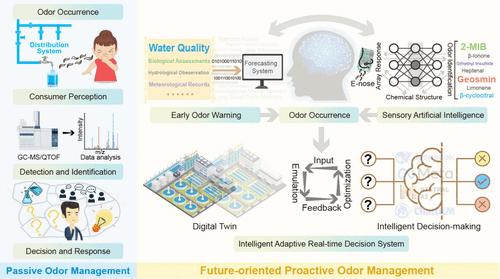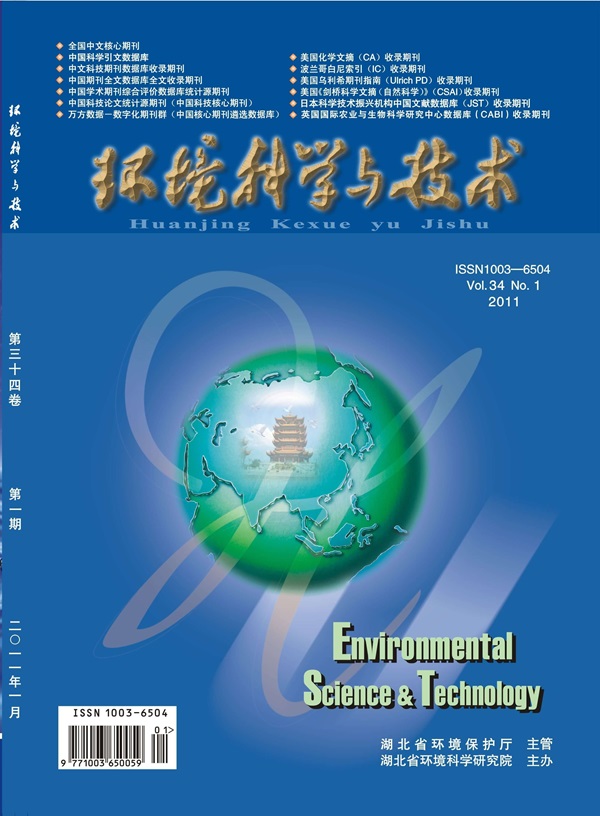从被动到主动:饮用水异味控制的新范式
IF 11.3
1区 环境科学与生态学
Q1 ENGINEERING, ENVIRONMENTAL
引用次数: 0
摘要
图1所示。被动和主动气味管理模式的比较。余水利博士,同济大学环境科学与工程学院教授。他于1983年获得哈尔滨工业大学理学学士学位,1986年获得理学硕士学位,1992年获得博士学位。1986-2009年在哈尔滨工业大学工作,2009年加入同济大学。他是IWA中国膜技术工作组副主席,IWA替代水资源工作组委员会成员。主要研究方向为水处理技术与理论,以及基于膜的水分离工艺。李磊博士是同济大学环境科学与工程学院的全职教授。2012年在同济大学获得博士学位,2009年至2012年在加州大学伯克利分校接受联合培训。他的研究重点是人工智能驱动的预测、机制理解,以及对饮用水中藻华、气味化合物和其他新出现的污染物的新控制技术的开发。国家自然科学基金(no . 52170011和42477076)、上海市科技重大专项(no . 2021SHZDZX0100)和中央高校基本科研业务费专项(no . 21ZR1466200)资助。本文引用了12个其他出版物。这篇文章尚未被其他出版物引用。本文章由计算机程序翻译,如有差异,请以英文原文为准。

From Passive to Proactive: A Novel Paradigm for Odor Control in Drinking Water
Figure 1. Comparison of passive and proactive odor management paradigms. Dr. Shuili Yu is a Full Professor at the College of Environmental Science and Engineering, Tongji University. He acquired a B.S. (1983), an M.S. (1986), and a Ph.D. (1992) from the Harbin Institute of Technology (China). He worked at Harbin Institute of Technology (1986–2009) and then joined Tongji University in 2009. He is the Vice Chairman of the IWA China Task force on Membrane Technology and a member of the Committee Member of the IWA Working Group on Alternative Water Resources. His research interests focus on water treatment technologies and theories, as well as membrane-based water separation processes. Dr. Lei Li is a Full Professor at the College of Environmental Science and Engineering, Tongji University. He received his Ph.D. from Tongji University in 2012, with a joint training program at the University of California, Berkeley, from 2009 to 2012. His research focuses on artificial intelligence-driven forecasting, mechanistic understanding, and the development of novel control techniques for algal blooms, odor compounds, and other emerging contaminants in drinking water. This work was supported by the National Natural Science Foundation of China (Grants 52170011 and 42477076), the Shanghai Municipal Science and Technology Major Project (2021SHZDZX0100), and the Fundamental Research Funds for the Central Universities, Shanghai Natural Science Foundation (21ZR1466200). This article references 12 other publications. This article has not yet been cited by other publications.
求助全文
通过发布文献求助,成功后即可免费获取论文全文。
去求助
来源期刊

环境科学与技术
环境科学-工程:环境
CiteScore
17.50
自引率
9.60%
发文量
12359
审稿时长
2.8 months
期刊介绍:
Environmental Science & Technology (ES&T) is a co-sponsored academic and technical magazine by the Hubei Provincial Environmental Protection Bureau and the Hubei Provincial Academy of Environmental Sciences.
Environmental Science & Technology (ES&T) holds the status of Chinese core journals, scientific papers source journals of China, Chinese Science Citation Database source journals, and Chinese Academic Journal Comprehensive Evaluation Database source journals. This publication focuses on the academic field of environmental protection, featuring articles related to environmental protection and technical advancements.
 求助内容:
求助内容: 应助结果提醒方式:
应助结果提醒方式:


